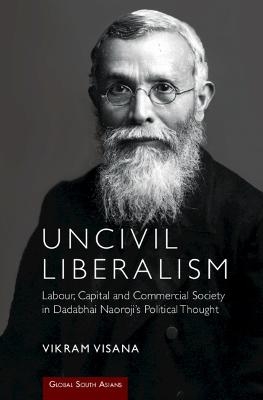
Uncivil Liberalism
Labour, Capital and Commercial Society in Dadabhai Naoroji's Political Thought
Seiten
2022
Cambridge University Press (Verlag)
978-1-009-21554-1 (ISBN)
Cambridge University Press (Verlag)
978-1-009-21554-1 (ISBN)
A global history of ideas linking capitalism, colonialism, labour and liberalism, the book will interest historians and political theorists keen to explore how liberalism was reinvented in the Global South for a more culturally diverse age by making labour rights, rather than cultural assimilation, the lynchpin of social cohesion.
Uncivil Liberalism studies how ideas of liberty from the colonized South claimed universality in the North. Recovering the political theory of Dadabhai Naoroji, India's pre-eminent liberal, this book offers an original global history of this process by focussing on Naoroji's pre-occupation with social interdependence and civil peace in an age of growing cultural diversity and economic inequality. It shows how Naoroji used political economy to critique British liberalism's incapacity for civil peace by linking periods of communal rioting in colonial Bombay with the Parsi minority's economic decline. He responded by innovating his own liberalism, characterized by labour rights, economic republicanism and social interdependence maintained by freely contracting workers. Significantly, the author draws attention to how Naoroji seeded 'Western' thinkers with his ideas as well as influencing numerous ideologies in colonial and post-colonial India. In doing so, the book offers a compelling argument which reframes Indian 'nationalists' as global thinkers.
Uncivil Liberalism studies how ideas of liberty from the colonized South claimed universality in the North. Recovering the political theory of Dadabhai Naoroji, India's pre-eminent liberal, this book offers an original global history of this process by focussing on Naoroji's pre-occupation with social interdependence and civil peace in an age of growing cultural diversity and economic inequality. It shows how Naoroji used political economy to critique British liberalism's incapacity for civil peace by linking periods of communal rioting in colonial Bombay with the Parsi minority's economic decline. He responded by innovating his own liberalism, characterized by labour rights, economic republicanism and social interdependence maintained by freely contracting workers. Significantly, the author draws attention to how Naoroji seeded 'Western' thinkers with his ideas as well as influencing numerous ideologies in colonial and post-colonial India. In doing so, the book offers a compelling argument which reframes Indian 'nationalists' as global thinkers.
Vikram Visana is Lecturer in Political Theory in the School of History, Politics and International Relations, University of Leicester. Prior to joining Leicester, he has taught at the Universities of Edinburgh and Huddersfield and was a postdoctoral fellow at the Free University of Berlin. He is a political theorist specializing in Indian political thought and global history.
Introduction; 1. Sociality in an Imperial and Industrial Age; 2. Sociality and the Parsis of Western India; 3. Civil Society and Social Reform; 4. Conceptualizing the Drain Theory; 5. Making Commercial Society in India; 6. Making Commercial Society in Britain; 7. The Afterlives of Naoroji's Political Thought; Conclusion; References; Index.
| Erscheinungsdatum | 29.11.2021 |
|---|---|
| Reihe/Serie | Global South Asians |
| Zusatzinfo | Worked examples or Exercises |
| Verlagsort | Cambridge |
| Sprache | englisch |
| Maße | 160 x 236 mm |
| Gewicht | 480 g |
| Themenwelt | Geisteswissenschaften ► Geschichte ► Regional- / Ländergeschichte |
| Sozialwissenschaften ► Politik / Verwaltung ► Politische Theorie | |
| ISBN-10 | 1-009-21554-X / 100921554X |
| ISBN-13 | 978-1-009-21554-1 / 9781009215541 |
| Zustand | Neuware |
| Haben Sie eine Frage zum Produkt? |
Mehr entdecken
aus dem Bereich
aus dem Bereich
Erinnerungen
Buch | Softcover (2024)
Pantheon (Verlag)
16,00 €
Universalgelehrter, Polarreisender, Entdecker
Buch | Hardcover (2024)
mareverlag
28,00 €


